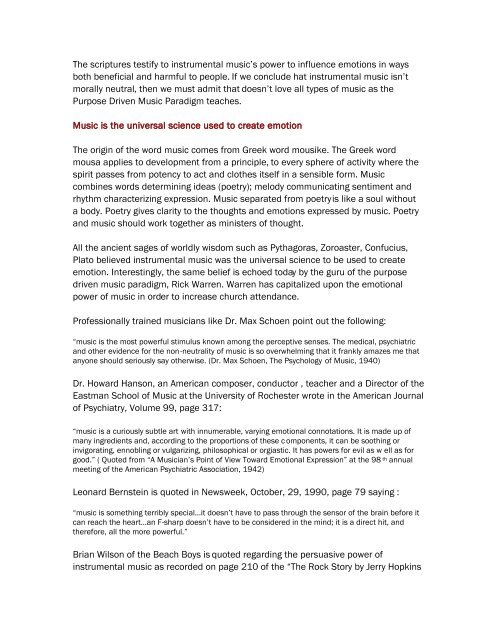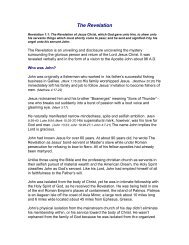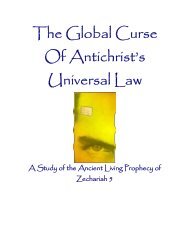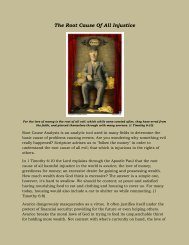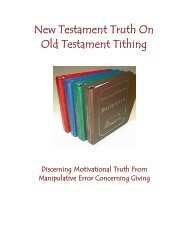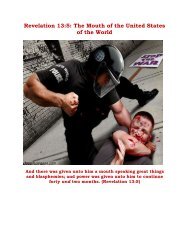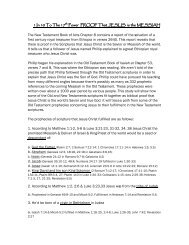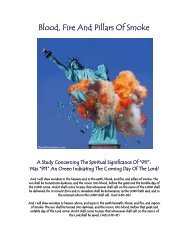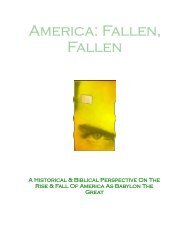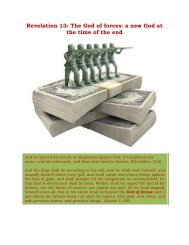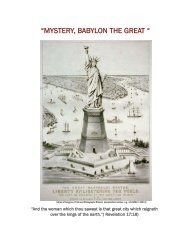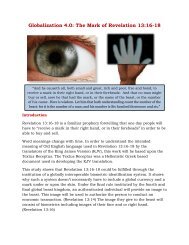the purpose driven music paradigm - Escape Babylon's Demons
the purpose driven music paradigm - Escape Babylon's Demons
the purpose driven music paradigm - Escape Babylon's Demons
You also want an ePaper? Increase the reach of your titles
YUMPU automatically turns print PDFs into web optimized ePapers that Google loves.
The scriptures testify to instrumental <strong>music</strong>’s power to influence emotions in ways<br />
both beneficial and harmful to people. If we conclude hat instrumental <strong>music</strong> isn’t<br />
morally neutral, <strong>the</strong>n we must admit that doesn’t love all types of <strong>music</strong> as <strong>the</strong><br />
Purpose Driven Music Paradigm teaches.<br />
Music is <strong>the</strong> universal science used to create emotion<br />
The origin of <strong>the</strong> word <strong>music</strong> comes from Greek word mousike. The Greek word<br />
mousa applies to development from a principle, to every sphere of activity where <strong>the</strong><br />
spirit passes from potency to act and clo<strong>the</strong>s itself in a sensible form. Music<br />
combines words determining ideas (poetry); melody communicating sentiment and<br />
rhythm characterizing expression. Music separated from poetry is like a soul without<br />
a body. Poetry gives clarity to <strong>the</strong> thoughts and emotions expressed by <strong>music</strong>. Poetry<br />
and <strong>music</strong> should work toge<strong>the</strong>r as ministers of thought.<br />
All <strong>the</strong> ancient sages of worldly wisdom such as Pythagoras, Zoroaster, Confucius,<br />
Plato believed instrumental <strong>music</strong> was <strong>the</strong> universal science to be used to create<br />
emotion. Interestingly, <strong>the</strong> same belief is echoed today by <strong>the</strong> guru of <strong>the</strong> <strong>purpose</strong><br />
<strong>driven</strong> <strong>music</strong> <strong>paradigm</strong>, Rick Warren. Warren has capitalized upon <strong>the</strong> emotional<br />
power of <strong>music</strong> in order to increase church attendance.<br />
Professionally trained <strong>music</strong>ians like Dr. Max Schoen point out <strong>the</strong> following:<br />
“<strong>music</strong> is <strong>the</strong> most powerful stimulus known among <strong>the</strong> perceptive senses. The medical, psychiatric<br />
and o<strong>the</strong>r evidence for <strong>the</strong> non-neutrality of <strong>music</strong> is so overwhelming that it frankly amazes me that<br />
anyone should seriously say o<strong>the</strong>rwise. (Dr. Max Schoen, The Psychology of Music, 1940)<br />
Dr. Howard Hanson, an American composer, conductor , teacher and a Director of <strong>the</strong><br />
Eastman School of Music at <strong>the</strong> University of Rochester wrote in <strong>the</strong> American Journal<br />
of Psychiatry, Volume 99, page 317:<br />
“<strong>music</strong> is a curiously subtle art with innumerable, varying emotional connotations. It is made up of<br />
many ingredients and, according to <strong>the</strong> proportions of <strong>the</strong>se c omponents, it can be soothing or<br />
invigorating, ennobling or vulgarizing, philosophical or orgiastic. It has powers for evil as w ell as for<br />
good.” ( Quoted from “A Musician’s Point of View Toward Emotional Expression” at <strong>the</strong> 98 th annual<br />
meeting of <strong>the</strong> American Psychiatric Association, 1942)<br />
Leonard Bernstein is quoted in Newsweek, October, 29, 1990, page 79 saying :<br />
“<strong>music</strong> is something terribly special…it doesn’t have to pass through <strong>the</strong> sensor of <strong>the</strong> brain before it<br />
can reach <strong>the</strong> heart…an F-sharp doesn’t have to be considered in <strong>the</strong> mind; it is a direct hit, and<br />
<strong>the</strong>refore, all <strong>the</strong> more powerful.”<br />
Brian Wilson of <strong>the</strong> Beach Boys is quoted regarding <strong>the</strong> persuasive power of<br />
instrumental <strong>music</strong> as recorded on page 210 of <strong>the</strong> “The Rock Story by Jerry Hopkins


